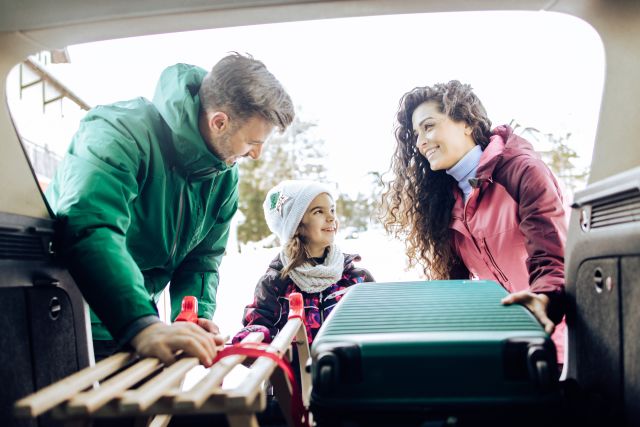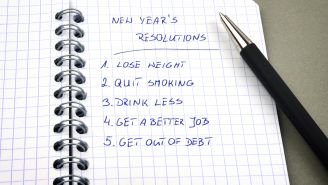Updated on December 15, 2023.
Traveling for the holidays can provide an exciting change of pace. It can bring loved ones closer together and offer a needed break from busy day-to-day routines. But reaching your destination takes planning and preparation that may be stressful. During winter, when airports, train stations, rest stops, and other indoor spaces are crowded, germs are more likely to be lurking—and spreading. Whether you’re staying close to home or crossing an ocean, there are steps you can take to help ensure a safe and healthy trip:
If you’re traveling by car
Being on the road during major holidays carries a higher level of risk than other times of year, in part because celebrations often include drinking. Throughout the year, about 3 in 10 driving fatalities involve alcohol, according to the National Safety Council (NSC). But on major holidays, that number tends to rise. For example, during the New Year’s Day period in 2020, alcohol played a role in almost half of traffic deaths.
To help prevent accidents, practice defensive driving, use seat belts, and designate sober drivers. Don’t drive if you’re tired, so you can stay awake and attentive. Remember to heed the following guidelines, as well:
Steer clear of your phone and other distractions. Distracted driving kills about 3,000 people in the United States each year, according to the Centers for Disease Control and Prevention (CDC). Many thousands more are injured. The three main kinds of distractions are visual, manual, and cognitive—taking your eyes, hands, and mind off the task at hand, respectively.
By itself, texting while driving is responsible for several hundred deaths annually. When you send or read a text, several seconds can elapse before you look at the road again. You may drive long stretches without even glancing at the surrounding traffic. But any distraction can lead to an accident, including eating, talking on the phone, and fiddling with the radio. While on the road, aim to avoid multitasking at all costs.
Take your car in for maintenance. Check that your tires are in good shape, the oil's been changed, and the battery is charged and clean. During winter, it’s a good idea to keep your gas tank at least half full. That helps prevent the gas line from freezing up—and will keep your car running if you get stranded.
Stock your trunk with more than luggage and gifts. Make room in your car for an emergency kit. Include blankets, a flashlight with batteries, a first aid kit, cell phone charger, and any medications you may be taking. Consider adding a pair of jumper cables, flares, and a tool kit, plus extra bottles of water and non-perishable snacks. Lastly, be sure you have an ice scraper and either cat litter or some sand for traction if you get stuck.
If you’re traveling by plane
Major holidays tend to be the busiest times at the nation’s airports. To help stay safe and lower your risk of illness in flight, consider the following.
Opt out of the in-flight cocktail. Humidity levels in airplanes are very low. Indulging in a drink or two on the plane is tempting, but due to the intensified effects of dehydration, you’re likelier to feel more intense headaches, nausea, thirst, and muscle cramping than if you were on the ground. Instead of drinking alcohol, sip some water.
Gaze at the horizon. On a plane you may feel increased motion or altitude sickness. But if you can look long-distance out the window, it may help. Yawning or swallowing during landing and takeoff can also help relieve the pressure in your middle ear.
Get up and move. Flights longer than four hours may increase your risk for deep vein thrombosis (DVT), a.k.a. economy class syndrome.
“There is an association between blood clots and long flights,” says Matthew Underwood, MD, an emergency medicine specialist in California. “You’re in cramped quarters; you’re sitting for a long time, not moving around, and you could be a little dehydrated.”
To reduce your risk, follow Dr. Underwood's advice: Find ways to move around during your flight, drink water to stay hydrated, and consider wearing compression socks or stockings. (Yes, they're worth it.)
General travel safety and well-being tips
No matter how you get where you’re going, remember the following.
Make and keep appointments with your healthcare provider (HCP) before heading out. Many people skip visits with their HCPs during busy holidays. Don't put it off, especially if you're feeling run down; you don't want to become sick while you're away from home.
Keep your vaccines up to date. If you're traveling abroad, ask your HCP or check the CDC for vaccination recommendations. No matter where you’re headed, make sure you’ve had your flu shot, the appropriate immunization for COVID-19, an RSV vaccine if you’re eligible, and a current tetanus shot.
Manage medications. Even if you're not going far, your prescriptions should be a top packing priority. “Make sure you have all of your medications with you, as well as a list in case you lose them," Underwood says. Store the list on your phone, so you don't have to hunt in your bags.
Don’t forget to relax. Packing, airport security, cramped flights, delays, long drives, and traffic jams are just a few of the reasons you may have excess anxiety or stress during traveling. Practicing self-care—such as doing a short meditation, listening to music, or trying other relaxation techniques—may help ease your stress level and help you feel less overwhelmed in the moment.







